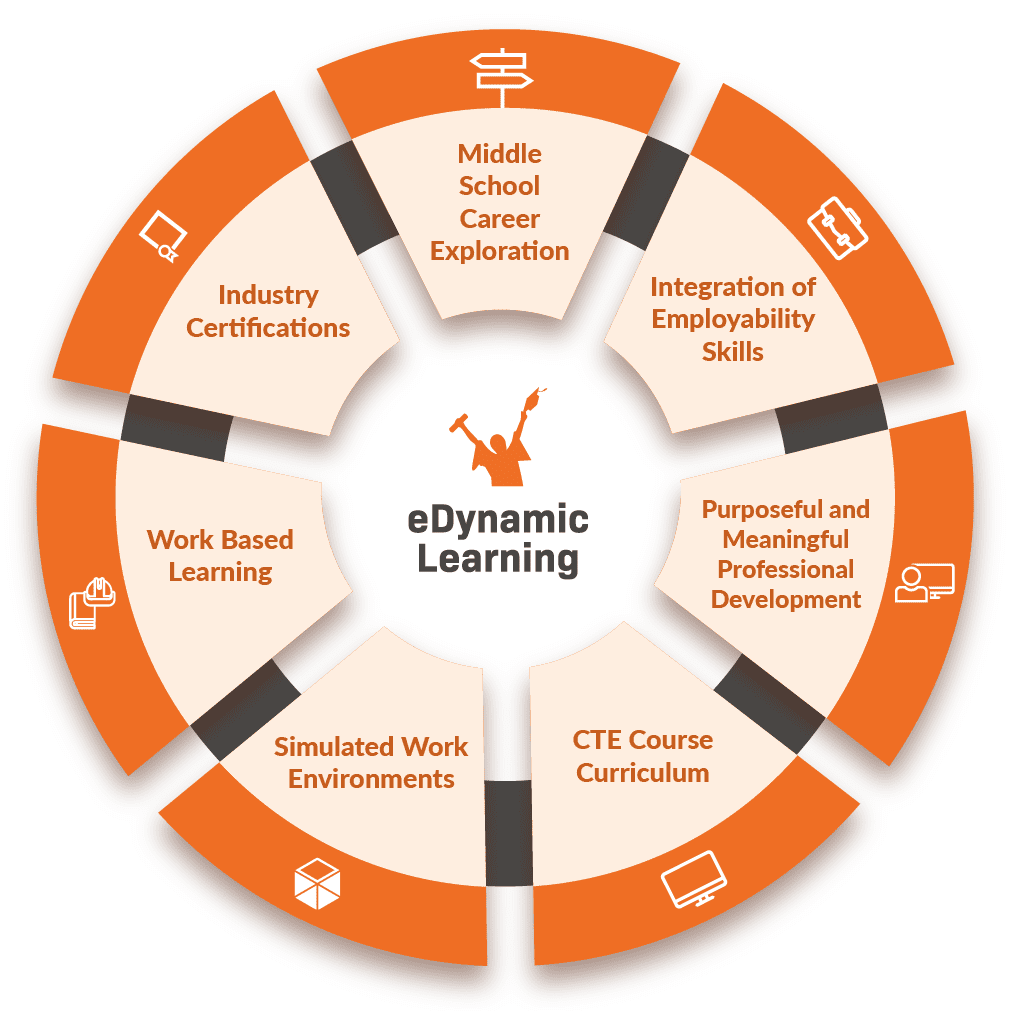Supporting Perkins V
eDynamic Learning is proud to support schools in meeting a variety of needs and requirements of the Perkins V Act.
The Strengthening Career and Technical Education for the 21st Century Act (Perkins V) amended the Carl D. Perkins Career and Technical Education (Perkins IV) Act of 2006 and reauthorized Perkins for six years. The law took effect on July 1, 2019.
The purpose of this Act is to develop more fully the academic knowledge and technical and employability skills of secondary education students who elect to enroll in career and technical education programs and programs of study, services, and activities. The Act provides technical assistance that:
- promotes leadership, initial preparation, and professional development at the state and local levels;
- improves the quality of career and technical education teachers, faculty, administrators, and counselors;
- supports partnerships among secondary schools, postsecondary institutions, baccalaureate degree-granting institutions, area career and technical education schools, local workforce investment boards, business and industry, and intermediaries;
- provides individuals with opportunities throughout their lifetimes to develop, in conjunction with other education and training programs, the knowledge and skills needed to keep the United States competitive;
- increases the employment opportunities for populations who are chronically unemployed or underemployed, including individuals with disabilities, individuals from economically disadvantaged families, out-of-workforce individuals, youth who are in, or have aged out of, the foster care system, and homeless individuals.
Click various sections of the wheel to learn more.

Industry Certifications
Industry certifications show mastery of or competency in specific knowledge, skills, or processes measured against a set of accepted standards. They are typically awarded through assessment and validation of skills in cooperation with a business, trade association, or other industry groups. Perkins V defines a career and technical education program as an organized educational activity that offers a sequence of courses that provides technical skill proficiency or a recognized postsecondary credential, which may include an industry-recognized credential, a certificate, or an associate degree. Learn how Career Ready courses from the eDynamic Learning CTE and Career Library can help you prepare students for nearly 100 industry certifications.
Career Exploration
Perkins V requires that states provide career exploration and career development activities through an organized, systematic framework. It is designed to aid students, including in the middle grades, before enrolling and while participating in a career and technical education program, in making informed plans and decisions about future education and career opportunities and programs of study. Learn how eDynamic Learning provides career exploration courses designed for middle and high school students.
Employability Skills
Perkins V supports the integration of employability skills into career and technical education programs and programs of study. Today’s employers are looking for candidates who possess essential employability and soft skills necessary to be effective in the workplace. Learn how eDynamic Learning’s Workplace & Internship Readiness course supports the employability framework and helps students develop the foundational skills they need to feel confident and prepared.
Purposeful and Meaningful Professional Development
Under Perkins V, professional development is defined as activities that are an integral part of strategies for providing educators with the knowledge and skills needed to enable students to succeed in CTE. Workshops need to be sustained (not stand-alone, 1-day, or short-term workshops), intensive, collaborative, job embedded, data driven, and classroom-focused, and to the extent practicable evidence-based. Learn how eDynamic Learning supports Perkins definition of professional development through a succession of three comprehensive workshops designed for CTE programs.
CTE Programs
Perkins V indicates that CTE programs should offer at least three different career fields that are available to all students, especially in high-skill, high-wage, or in-demand industry sectors or occupations. Learn how eDynamic Learning’s CTE curriculum aligns to the National Career Clusters.
Simulated Work Environments
Perkins V funds can be used to support opportunities to experience careers, such as simulated work environments and other hands-on or inquiry-based learning activities. Learn how Knowledge Matters offers simulated work environments to enable students to test and apply real business concepts in an interactive, risk-free, game-based environment and see the impact of their choices immediately.
Work-Based Learning
State and local agencies can spend Perkins funds on efforts to promote, create, or expand work-based learning opportunities. This includes effective and meaningful collaboration between secondary schools, postsecondary institutions, and employers to provide students with experience in, and understanding of, all aspects of an industry. Opportunities may include work-based learning such as internships, mentorships, simulated work environments, and other hands-on or inquiry-based learning activities. Our year-long Virtual Internship Program is designed to prepare students prior to stepping into the workplace, and gives them opportunities to test and try concepts in a risk-free simulated environment.
*Some of the Perkins V requirements vary by state.
